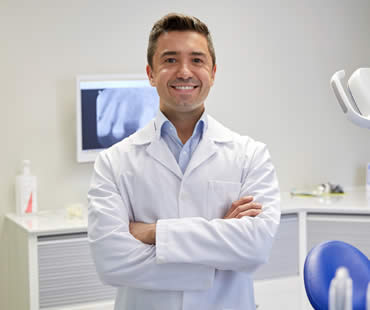
If you are currently a denture wearer, you know that dentures can be problematic when it comes to eating a wide variety of foods, especially those foods with a very crunchy or chewy texture. Dentures can click or move when you are eating, or food debris can collect underneath, leading to poor fit and irritation of the soft palate and gums. Over time, if your dentures aren’t properly cleaned, this can lead to an odor in the dentures that causes bad breath for the wearer.
Issues with stability and retention of standard dentures mean that many wearers have food restrictions, including healthful and fresh foods they previously enjoyed with their healthy natural teeth. Some of the most nutritious foods available are problematic for denture wearers, making chewing difficult. Because so much of the digestion process begins in the mouth with the mastication of food, poorly chewed food can cause digestion difficulties and eventually be a factor in overall poor health.
Standard dentures can also affect the enjoyment of eating the foods that are allowed. They can be bulky, especially on the roof of the mouth, taking away a large part of savoring the texture and flavor of foods.
Hybrid dentures address all of these issues. They are crafted so that the roof of the mouth remains completely open and uncovered. Texture and flavor are enhanced over typical dentures. Hybrid dentures are affixed firmly with four or more dental implants functioning as anchors. These denture anchors are extremely secure and stable, giving the wearer the confidence to eat, drink, and speak.
Talk to your dentist today to see if hybrid dentures can improve your life. Experience the positive effects of hybrid dentures as your put your best smile forward with confidence that it looks and functions virtually identically to your natural teeth and gums.
We look forward to seeing you in our Longview dental office

There are a number of reasons that dentists or oral surgeons recommend surgery, but facial injuries are probably the most unexpected and alarming cause. Maxillofacial injury, or facial trauma, refers to any injury to the mouth, jaw, and face. Most of these injuries result from sports, car accidents, job accidents, violence, or an accident at home. Let’s learn about oral surgery resulting from facial trauma.
Broken bones are a common type of serious facial injury. Fractures can occur in the upper or lower jaw, cheekbones, palate, and eye sockets. Injuries in these locations may affect vision and the ability to eat, talk, and breathe. Hospitalization is often required for treatment, which is similar to that for fractures in other parts of the body. The bones must be lined up and held in place to allow time to heal them in the correct position. Because casts are not possible in facial injuries, the surgeon may use wires, screws, or plates to treat fractures. Sometimes healing takes as long as six weeks or more.
Even though some facial injuries are worse than others, all of them should be taken seriously. They affect an important area of the body, so it is recommended to seek treatment from an oral surgeon to make sure you receive optimum care. Even if stitches are all that’s required, it’s best to have them performed by an oral surgeon who can place them exactly as needed to produce the best results.
It’s no surprise that the best solution for facial injuries is to prevent them in the first place. Oral surgeons suggest consistent use of mouth guards, seat belts, and masks and helmets as required. Improvements have been made to safety gear to make these items more comfortable and efficient, so there should be no excuses for not using them to protect yourself and avoid injuries that can lead to oral surgery.
We treat patients from Longview and the surrounding area

Does your smile need some work? Are you sensitive about your teeth and how you may look while you eat or drink? Does speaking in public leave you anxious because you’re worried about the appearance of your teeth? Have you been putting off talking to a cosmetic dentist because you’re worried about the dental therapies you might need? Don’t be afraid of a smile makeover! A smile makeover can be a simple thing, as minor and fast as teeth whitening, a process that can often be completed in-office in a single visit.
If you are looking for solutions to your smile problems, begin by finding a skilled cosmetic dentist. You want to be sure to see photographs of some of the actual work done by a particular cosmetic dentist. Don’t assume that what you see online are actual patient photographs – they may be someone’s patients, but if they weren’t this dentist’s patients, you’re not getting any closer to identifying the right cosmetic dentist for you.
Ask around for private recommendations from friends and family; it might surprise you how many people you know have had work done to their smiles. You might assume that your coworker’s smile is all natural, only to learn it’s the result of a skilled cosmetic dentist and veneer work done so carefully and well that they look just like natural teeth.
Dental veneers can transform your smile in only a few visits. Good veneers will be made of materials that mimic the color and translucency of natural teeth. They won’t look puffy, too long or artificial and will complement your hair and skin color. Orthodontia can change the alignment of your teeth, with choices such as Invisalign to help you feel more confident as you change your smile.
A smile makeover can benefit you in so many ways by simply boosting your self-confidence. After you complete your treatment, you will be surprised at how much better you feel about yourself and about life in general. You will face the day with confidence, knowing you can live your life without worry about your smile.
Dr. DiStefano is a cosmetic dentist in Longview offering smile makeovers.

If you are unhappy with your smile, porcelain veneers are a cosmetic dentistry option that can provide you with flawless teeth. Veneers are a very popular way to improve your appearance without a major, invasive procedure. Here are some things you should know about porcelain veneers if you are considering them as a solution for an imperfect smile.
Difference between veneers and crowns
The purpose of veneers is to restore your smile, and your original teeth are not removed or altered. However, a large part of the original tooth structure is removed with crowns in the process of building a new tooth. If you’re seeking a minimally invasive option, veneers may be your answer.
Natural appearance
Veneers are customized just for you, so your smile can be personalized to meet your desires. Your teeth will look natural and healthy. Porcelain is translucent and provides a realistic look to your smile. Also, stains do not stick to porcelain and even if there is any small staining, it can be easily polished off during a dental cleaning.
Permanent solution
Veneers are a permanent tooth restoration, so make sure you are happy with the color and shape before they are placed using dental cement. Alterations cannot be made once the veneers are in place.
Requires healthy teeth
A thorough examination by your dentist is required to determine if veneers are right for you. Some oral conditions do not work well with veneers, so your dentist will make sure your teeth and mouth are healthy enough to work successfully with veneers.
Cosmetic Dentist in Longview

When you visit the dentist, you often see other professionals in the office. Usually, the dentist will have a hygienist and a dental assistant as part of the team. While their roles aren’t the same as the dentist’s job, these individuals do play an important part in your dental care. Understanding what the hygienist and dental assistant do can make you feel more comfortable at your dental appointments.
The Dental Assistant
To become a dental assistant, an individual usually completes course work through a community college or technical school. This training will provide hands-on experience before the dental assistant works in an actual dental practice. A dental assistant can serve many functions, including assisting the dentist during treatment, taking impressions, sterilizing instruments, and making temporary crowns for patients. Dental assistants also welcome patients and help them feel comfortable in the dental office.
The Dental Hygienist
At a minimum, a dental hygienist must earn an associate’s degree, though many hygienists choose to obtain four-year degrees. Additionally, hygienists must be licensed in the states where they practice. The dental hygienist is generally responsible for taking patient x-rays, performing an initial periodontal assessment, and cleaning your teeth. During your appointment, the hygienist will also offer tips on home hygiene to help you maximize your oral car routine. A dental hygienist may also perform deep cleanings for gum disease, apply fluoride, remove sutures, and administer local anesthetic.

Your body is a little bit like a puzzle. It gives you clues to help you figure out what’s going on within your body. Did you know your mouth can give you hints about things that may be happening elsewhere in your body? Here’s a list of some of the signs your mouth can give you to pay attention to certain other aspects of your health.
Worn teeth and headache
If your teeth are showing extensive wear, you may be grinding your teeth. This would be even a stronger possibility if you’re also experiencing regular headaches, which can be caused by the muscle tension related to teeth grinding. This condition also indicates that you are likely under too much stress, and that you are unconsciously coping with it by grinding your teeth.
Gums covering teeth
If your gums begin to grow over your teeth and you are on medication, it may mean that your medication is at fault. Some medicines can cause your gums to overgrow, and the dosage needs to be adjusted.
Mouth sores
An open sore in your mouth that doesn’t go away in a couple of weeks can be an indicator of oral cancer. Numbness and unexplained bleeding in your mouth are other signs. Smokers and people over age 60 are at the most risk, but that doesn’t mean it doesn’t affect others too. See your dentist to make sure all is okay.
Cracked teeth
If your teeth begin to crack or wear extensively, you may have gastroesophogeal reflux disease (GERD). It’s a digestive disease that allows stomach acid to flow back into your food pipe and mouth. This acid can cause your teeth to deteriorate. Additional signs of GERD are acid reflux, heartburn, and dry mouth.
Unclean dentures
If you wear dentures, make sure you remove and clean them regularly. Inhaling food debris from your dentures that makes its way to your lungs can lead to pneum









